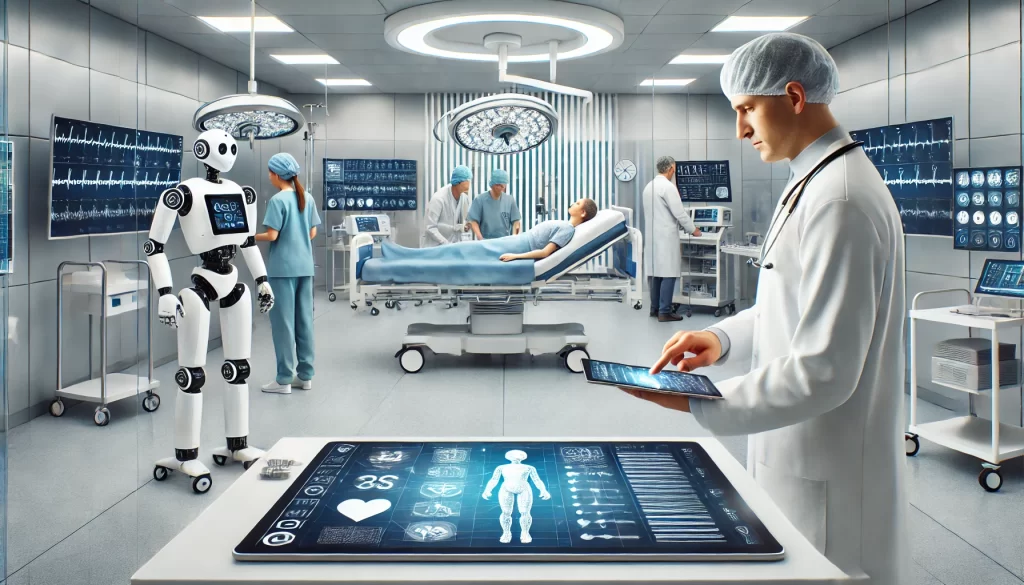AI in Healthcare: Transforming the Future of Medicine
Artificial Intelligence (AI) is revolutionizing healthcare, reshaping how we approach diagnosis, treatment, patient care, and medical research. The integration of AI into healthcare systems enhances efficiency, accuracy, and accessibility. In this article, we will explore how AI is transforming healthcare, the tools and technologies making a difference, and the potential it holds for the future. Additionally, we’ll introduce some AI-powered tools available on Amazon that can benefit healthcare professionals and individuals alike.
AI Applications in Healthcare
1. Diagnostics and Early Detection
AI excels in analyzing large datasets, making it an invaluable tool for diagnostics. AI-powered algorithms can detect diseases such as cancer, diabetes, and cardiovascular conditions at an early stage by analyzing medical images, lab results, and patient histories. For instance:
- AI-based radiology tools assist in identifying abnormalities in X-rays, MRIs, and CT scans faster than traditional methods.
- Algorithms for predictive analytics help assess the risk of chronic diseases.
2. Personalized Medicine
AI enables tailored treatment plans based on an individual’s genetic makeup, lifestyle, and medical history. By analyzing vast datasets, AI identifies the most effective therapies for specific patient groups, minimizing trial and error in treatment.
3. Virtual Health Assistants
AI-powered virtual assistants, like chatbots, are streamlining patient interaction by:
- Providing medication reminders.
- Scheduling appointments.
- Answering basic health-related queries.
4. Drug Discovery and Development
AI accelerates the drug discovery process by identifying potential compounds and predicting their effects. It reduces the time and cost associated with bringing new drugs to market.
5. Remote Patient Monitoring
Wearable devices integrated with AI monitor patients’ vital signs in real-time. These devices alert healthcare providers to potential health issues, ensuring timely intervention and reducing hospital readmissions.
AI-Powered Tools Available on Amazon
1. Omron Platinum Blood Pressure Monitor
This AI-powered device provides accurate blood pressure readings and connects to a smartphone app for tracking and analysis.
- Features: Advanced accuracy, irregular heartbeat detection, and Bluetooth connectivity.
Amazon Link: Omron Platinum Blood Pressure Monitor
2. Fitbit Charge 5 Advanced Fitness and Health Tracker
Fitbit Charge 5 is equipped with AI features that track heart rate, oxygen levels, sleep patterns, and stress management insights.
- Features: Real-time health metrics, GPS tracking, and compatibility with popular health apps.
Amazon Link: Fitbit Charge 5
3. KardiaMobile 6L by AliveCor
This portable ECG monitor provides medical-grade heart rhythm analysis and connects to a smartphone app for instant results.
- Features: Detects atrial fibrillation, bradycardia, and tachycardia.
Amazon Link: KardiaMobile 6L
4. Tempdrop Smart Thermometer
This wearable thermometer uses AI to track and predict body temperature fluctuations, aiding in fertility tracking and general health monitoring.
- Features: Continuous tracking, sleep insights, and cycle predictions.
Amazon Link: Tempdrop Smart Thermometer
5. Withings Body+ Smart Scale
The Withings Body+ scale uses AI to analyze body composition, including weight, fat percentage, and muscle mass.
- Features: Wi-Fi connectivity, multiple user profiles, and integration with health apps.
Amazon Link: Withings Body+ Smart Scale
Benefits of AI in Healthcare
1. Improved Accuracy
AI algorithms reduce the likelihood of human error, ensuring more precise diagnoses and treatments. For example, AI in radiology achieves higher accuracy in identifying tumors compared to traditional methods.
2. Enhanced Efficiency
Automating administrative tasks, such as scheduling and patient data management, allows healthcare professionals to focus more on patient care.
3. Cost Reduction
AI reduces costs by minimizing unnecessary tests, hospitalizations, and delays in treatment.
4. Accessibility
Virtual health assistants and telemedicine platforms powered by AI make healthcare accessible to people in remote or underserved areas.
5. Proactive Care
AI enables continuous monitoring and early detection of health issues, leading to preventive care rather than reactive treatment.
Challenges and Ethical Considerations
While AI in healthcare offers numerous benefits, it also raises challenges and ethical concerns:
1. Data Privacy
AI systems rely on large datasets, raising concerns about the security and confidentiality of patient information.
2. Bias in Algorithms
If training datasets are biased, AI systems may produce inequitable outcomes, affecting certain demographics disproportionately.
3. Regulatory and Legal Issues
The lack of clear regulations around AI use in healthcare complicates its adoption.
4. Integration with Existing Systems
Integrating AI tools into traditional healthcare systems can be complex and require significant investment.
The Future of AI in Healthcare
The future of AI in healthcare is promising, with advancements in areas such as:
1. AI-Driven Surgeries
Robotic surgery systems with AI assistance ensure higher precision and shorter recovery times.
2. Genomic Analysis
AI is being used to analyze genomic data, paving the way for personalized medicine.
3. AI-Powered Mental Health Tools
Chatbots and virtual therapists powered by AI are offering support for mental health issues like anxiety and depression.
Conclusion
AI in healthcare is not just a trend; it is a transformative force reshaping the medical field. From improving diagnostics and personalized treatments to making healthcare more accessible, AI has the potential to enhance patient outcomes and revolutionize the industry. Tools like the Omron Blood Pressure Monitor, Fitbit Charge 5, and KardiaMobile are just a few examples of how AI is already making a difference in everyday healthcare.
Embracing these innovations while addressing the associated challenges will ensure that AI continues to improve lives and make healthcare more efficient, affordable, and inclusive.
Ready to integrate AI into your health routine? Explore the tools mentioned above and discover the future of healthcare at your fingertips.

